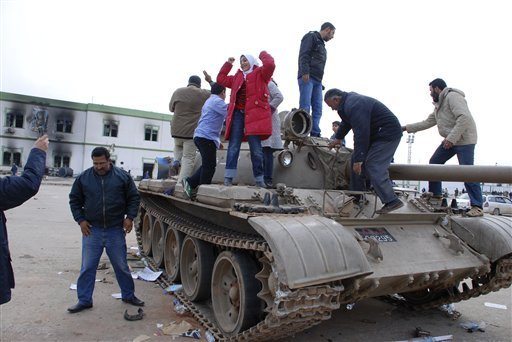From teenagers brandishing Kalashnikov rifles on the streets of Tripoli to fighters with shoulder-mounted grenade launchers on Libya’s front lines, rarely has a country seen so many weapons in so many hands.
And the proliferation of arms — raided from the vast stores of ex-strongman Moamer Kadhafi — is raising fears not only for Libya’s future stability, but also that the weapons will fall into the hands of radical groups like Al-Qaeda.
At an abandoned construction site on the outskirts of Tripoli, discarded boxes once filled with assault and sniper rifles, rocket-propelled grenade launchers and ammunition lie scattered across the ground.
For five days here after the fall of Tripoli in late August, thousands of people flocked to the site to seize weapons secretly stored in the basement of an unfinished housing project.
“There were hundreds and hundreds of boxes, with everything: Kalashnikovs, sniper rifles, grenades, ammunition,” said Imed, a 25-year-old Tripoli resident who helped himself to an assault rifle at the site.
“There were thousands of people here. Some people, like me, took just one gun, but others took two, three, five. Some stayed here for days loading up trucks.”
The site was one of several weapons dumps scattered throughout Tripoli by the Kadhafi regime that were raided following his ouster.
Imed, who refused to have his last name published, said the raiding was a free-for-all, with no control over who was helping themselves to the weapons.
Tripoli residents said the arms are now obtainable on the black market, with Kalashnikovs selling for about $650 (480 euros), grenades for $80 and bullets for less than a dollar each.
“Everyone in Tripoli has at least one rifle now,” Imed said. “People will not give them up, that’s for sure. We have freedom now.”
Many of the weapons have made their way into the hands of fighters for Libya’s National Transitional Council (NTC) struggling to take the two remaining bastions of Kadhafi support, Sirte and Bani Walid.
But the streets of Tripoli are also awash with guns, with young men, some barely into their teens, manning checkpoints into the city with Kalashnikovs, and even rocket launchers, slung over their shoulders.
At night, the capital echoes with bursts of automatic gunfire.
Western governments, in particular the United States, have raised deep concerns over the proliferation of Libya’s weapons.
The US State Department has provided $3 million to help destroy weapons and raised particular concern over the spread of shoulder-fired anti-aircraft missiles, also known as Man-Portable Air-Defense Systems (MANPADS), which could be used to target civilian aircraft.
“Everyone is concerned. Libyan weapons stocks, by some accounts, exceeded those present in Iraq in 2003. Many thousands of dangerous shoulder-launched missiles have been looted, as have RPGs, small arms and ammunition,” said Shashank Joshi, an associate fellow at the London-based Royal United Services Institute, a security think-tank.
A key risk, he said, was that “missiles find their way to terrorists in other theatres of war, like Afghanistan, or are used by terrorists against civilian airliners.”
Analysts said the weapons will also make it very difficult for Libya’s new authorities to consolidate their authority in the country, even after they take control of the last redoubts of Kadhafi support.
“It will be very difficult for the new authorities to round up all the weapons. It will take a long time before we see a central Libyan authority who can claim to have a monopoly on the legitimate use of force,” said Karim Bitar, a fellow at the Paris-based Institute for International and Strategic Relations.
“Many rebel groups took up arms and fought rather independently to free their own towns,” he said. “They will not relinquish their arms until they know exactly who is in charge at the national level and until they get very solid guarantees.”










